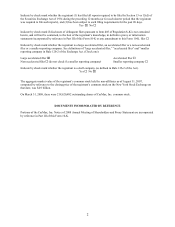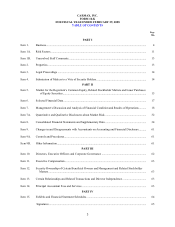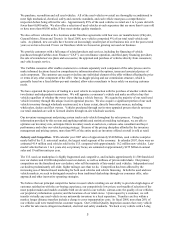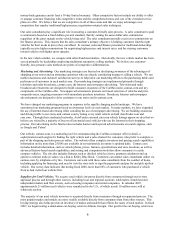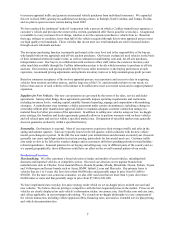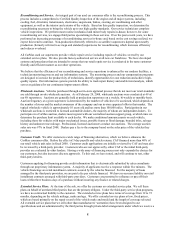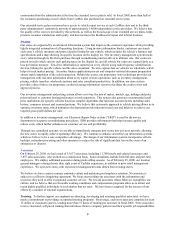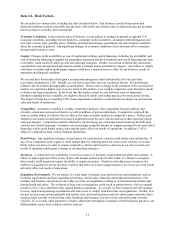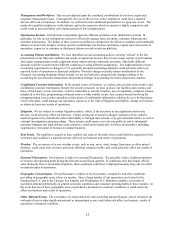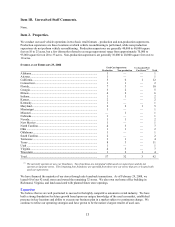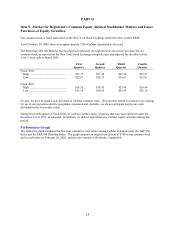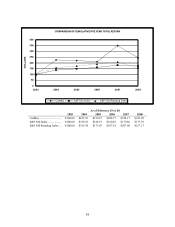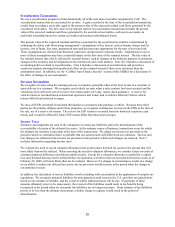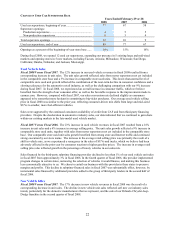CarMax 2008 Annual Report Download - page 24
Download and view the complete annual report
Please find page 24 of the 2008 CarMax annual report below. You can navigate through the pages in the report by either clicking on the pages listed below, or by using the keyword search tool below to find specific information within the annual report.12
Management and Workforce. Our success depends upon the continued contributions of our store, region and
corporate management teams. Consequently, the loss of the services of key employees could have a material
adverse effect on our business. In addition, we will need to hire additional personnel as we open new stores. The
market for qualified employees in the industry and in the regions in which we operate is highly competitive and
could result in increased labor costs during periods of low unemployment.
Information Systems. Our business is dependent upon the efficient operation of our information systems. In
particular, we rely on our information systems to effectively manage sales, inventory, consumer financing and
customer information. The failure of these systems to perform as designed or the failure to maintain and continually
enhance or protect the integrity of these systems could disrupt our business operations, impact sales and results of
operations, expose us to customer or third-party claims or result in adverse publicity.
Accounting Policies and Matters. We have identified several accounting policies as being “critical” to the fair
presentation of our financial condition and results of operations because they involve major aspects of our business
and require management to make judgments about matters that are inherently uncertain. Materially different
amounts could be recorded under different conditions or using different assumptions. The implementation of new
accounting requirements or changes to U.S. generally accepted accounting principles could adversely affect our
reported results of operations or financial condition. Potential changes currently under consideration by the
Financial Accounting Standards Board include, but are not limited to, proposed rule changes relating to the
accounting for securitization transactions and potential changes in accounting for leases and pension expense.
Confidential Customer Information. In the normal course of business, we collect, process and retain sensitive and
confidential customer information. Despite the security measures we have in place, our facilities and systems, and
those of third-party service providers, could be vulnerable to security breaches, acts of vandalism, computer viruses,
misplaced or lost data, programming or human errors or other similar events. Any security breach involving the
misappropriation, loss or other unauthorized disclosure of confidential information, whether by us or by third-party
service providers, could damage our reputation, expose us to the risks of litigation and liability, disrupt our business
or otherwise harm our results of operations.
Litigation. We are subject to various litigation matters, which, if the outcomes in any significant matters are
adverse, could adversely affect our business. Claims arising out of actual or alleged violations of law could be
asserted against us by individuals, either individually or through class actions, or by governmental entities in civil or
criminal investigations and proceedings. These actions could expose us to adverse publicity and to substantial
monetary damages and legal defense costs, injunctive relief and criminal and civil fines and penalties, including
suspension or revocation of licenses to conduct business.
Real Estate. The inability to acquire or lease suitable real estate at favorable terms could limit the expansion of our
store base and could have a material adverse affect on our business and results of operations.
Weather. The occurrence of severe weather events, such as rain, snow, wind, storms, hurricanes or other natural
disasters, could cause store closures, adversely affecting consumer traffic, and could adversely affect our results of
operations.
Seasonal Fluctuations. Our business is subject to seasonal fluctuations. We generally realize a higher proportion
of revenue and operating profit during the first and second fiscal quarters. If conditions arise that impair vehicle
sales during the first or second fiscal quarters, these conditions could have a disproportionately large adverse effect
on annual results of operations.
Geographic Concentration. Our performance is subject to local economic, competitive and other conditions
prevailing in geographic areas where we operate. Since a large number of our superstores are located in the
Southeastern U.S. and in the Chicago, Los Angeles and Washington, D.C./Baltimore markets, our results of
operations depend substantially on general economic conditions and consumer spending habits in these markets. In
the event that any of these geographic areas experienced a downturn in economic conditions, it could adversely
affect our business and results of operations.
Other Material Events. The occurrence of certain material events including natural disasters, acts of terrorism, the
outbreak of war or other significant national or international events could adversely affect our business, results of
operations or financial condition.


